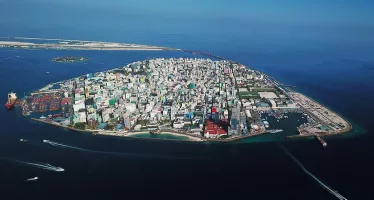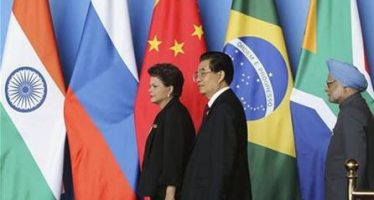Sergey Glazyev: Much More Than Meets the Eye
 Sergey Glazyev, one of the closest advisers to Russian President Vladimir Putin, has a predilection for preaching doom and gloom, especially when it comes to the economic prospects of recalcitrant Ukraine. Mr Glazyev is wholly convinced that the force of arms is superfluous to getting Kiev back in line.
Sergey Glazyev, one of the closest advisers to Russian President Vladimir Putin, has a predilection for preaching doom and gloom, especially when it comes to the economic prospects of recalcitrant Ukraine. Mr Glazyev is wholly convinced that the force of arms is superfluous to getting Kiev back in line.
An economist and philosopher by training, Mr Glazyev predicts that the West will instantly give up on the Ukraine once the true extend of that country’s financial needs becomes apparent. “Unless the Ukraine receives the $120bn required to stave off a meltdown of its economy now, some $300bn will be needed at a later stage to undo the damage wrought. Without Russia and the Eurasian Customs Union, the country simply stands no chance.”
Pundits in Moscow suspect that Mr Glazyev’s economic analysis of the Ukraine convinced President Putin to scale down military operations in the eastern part of the country and reduce the level of support offered to pro-Russian separatists. Mr Glazyev considers it much smarter to relax and sit back waiting for winter to bite and finish the job.
“While considered an oddball by some for his periodic nationalistic rants, Mr Glazyev has the attention of the powerful in the Kremlin.”
While considered an oddball by some for his periodic nationalistic rants, Mr Glazyev has the attention of the powerful in the Kremlin. He plies them with often well-founded arguments that underpin the natural desire of Mr Putin and the members of his cabinet to assert Russia’s might in the world. While formally in charge of furthering the Eurasian Customs Union, one of President Putin’s pet projects, Mr Glazyev’s not inconsiderable influence extends to nearly all foreign policy issues.
Mr Glazyev authored over forty books and a multitude of research papers, mostly on Russia’s position in the wider world. Since 2008, he is a member of the prestigious Russian Academy of Sciences. In 2004, Mr Glazyev ran for president as an independent candidate after the leadership of the left-wing nationalistic Rodina Party, which he helped found in 1999, refused to endorse his candidacy. In 2007, Mr Glazyev retired from politics with a sneer to Vladimir Putin who he accused of stifling political debate and crowding out the opposition.
In a perfect example of the “Putinesque” tendency to keep enemies closer, Mr Glazyev was invited to join the Kremlin’s inner circle in 2012. Here he thrived and was able to put his anti-Americanism on full display. This, however, may bode ill: Only last month Mr Glazyev caused some unease after declaring that the smaller regional wars now wreaking havoc in various corners of the world were actually instigated by the United States in preparation for World War III: “Because America is in decline, it needs war in order to prevail over China, weaken the European Union, and undermine Russia. Only this way will the US be able to control Eurasia.”
It would be a serious mistake to write Mr Glazyev off as a crackpot. His intellectual powers are not inconsiderable. As a doctor of philosophy, a respected economist, and a tireless crusader against corruption and the power of the oligarchs, Mr Glazyev is not a political featherweight and commands respect even from those, like Mr Putin, whom he initially opposed and attacked.
With the recent ascendancy of the so-called “siloviski” – the hardliners – Mr Glazyev has now gained a prominence that was denied him as a politician. As tensions with the West escalate and sanctions tighten, Mr Glazyev is increasingly called upon to find answers. He is currently working on a draft proposal to restrict the outflow of foreign exchange. This year, investors are expected to withdraw an estimated $150bn from Russia. Mr Glazyev appears to favour the introduction of capital controls in the form of a tax on funds being moved abroad. He has also suggested decoupling the rouble from the market and fixing its exchange rate.
With a great say in both financial matters and foreign policy, Mr Glazyev is a man to watch closely for clues on deciphering Russia’s next move.
You may have an interest in also reading…
The Swiss Banks: Handing Over Data
The tax row with the United States is raising a feeling of uncertainty among cantonal banks, as well as adding
Pioneering Shari’ah Finance Philosophy with a Go-Ahead, Client-Centric Stance
Collaboration and consideration of diversity has taken MIB to the forefront of banking in Maldives The story of the Maldives
BRICS Countries Crystalize Spirit of Practical Cooperation at Delhi Summit
By Xinhua writers Liu Chen, Mao Xiaoxiao, Wu Qiang As the Fourth BRICS leaders meeting drew its curtain Thursday in
















































































